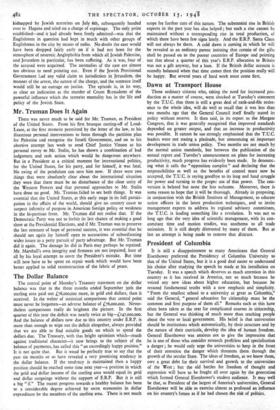Mr. Truman Does It Again
There was never much to be said for Mr. Truman, as President of the United States. From his first brusque cutting-off of Lend- Lease, at the first moment permitted by the letter of the law, to his disastrous personal interventions to force through the partition plan for Palestine and recognise the Israeli Government, and on to his abortive attempt last week to send Chief Justice Vinson as his personal envoy to Mr. Stalin, he has shown a combination of bad judgement and rash action which would be dangerous anywhere. But in a President at a critical moment for international politics, for the United States, for his party, and for himself, it was fatal. No swing of the pendulum can save him now. If there were two things that were absolutely clear about the international situation they were that there must be no disturbance of the close unity of the Western Powers and that personal approaches to Mr. Stalin have done no good. Mr. Truman failed to see both things. It was essential that the United States, at this early stage in its full partici- pation in the affairs of the world, should give no country cause to suspect infirmity of purpose in American ioreign policy or weakness in the bi-partisan front. Mr. Truman did not realise that. If the Democratic Party was not to forfeit its last chance of making a good show at the Presidential Elections, and if Mr. Truman was to preserve the last remnant of hope of personal success, it was essential that he should not again lay himself open to accusations of subordinating wider issues to a petty pursuit of party advantage. But Mr. Truman did it again. The damage he did in Paris may perhaps be repaired. Mr. Marshall's own integrity and firmness are not impaired, least of all by his loyal attempt to cover the President's mistake. But time will now have to be spent on repair work. which would have been better applied to solid reconstruction of the fabric of peace.


































 Previous page
Previous page